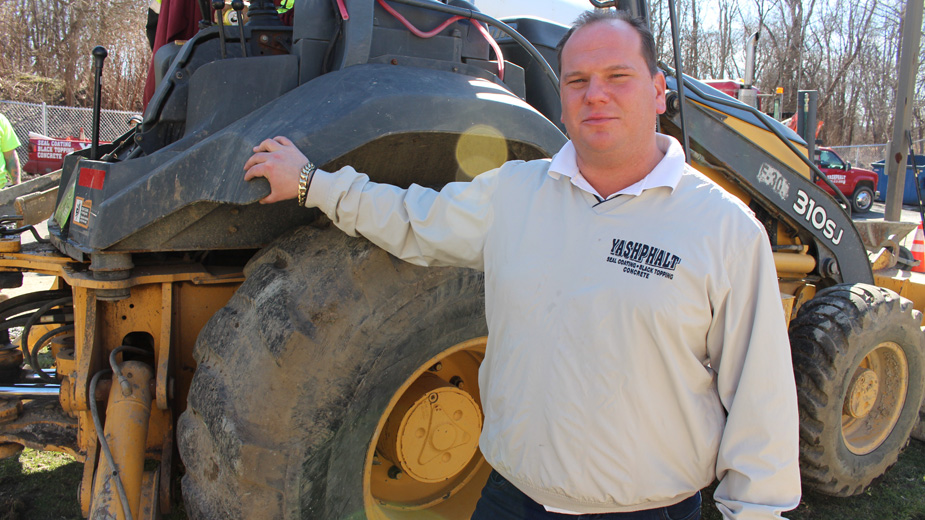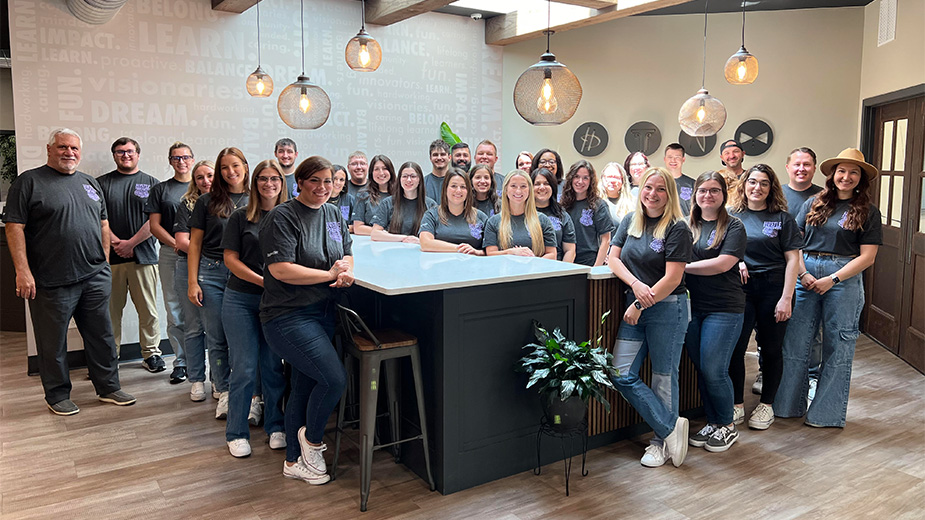Pavers Gear Up as Busy Spring Season Arrives
By Peter H. Millken
YOUNGSTOWN, Ohio – As paving season begins, executives of small paving and pavement maintenance companies say they’re having trouble hiring the qualified workers they need.
“Every year, it’s the same process of trying to find people that have a little bit of experience,” says Bob Roth, vice president of Asphalt Solutions Inc., Austintown.
“We’re looking for anyone who can be a paver operator to a roller operator to anyone who can do grading and excavation,” Roth says.
His company, founded in 2000, teaches employees to perform seal coating, crack repair and line striping, Roth says.
It’s been challenged in finding truck drivers with commercial drivers’ licenses to haul heavy equipment to its work sites. For all jobs, Roth says, he seeks people who hold a valid regular driver’s license, can pass a drug test and be punctual.
“I do have difficulty finding qualified workers in all aspects,” says Gary Slider, owner and president of EverBrite Power Sweeping and Paving of North Jackson, a pavement maintenance company founded in 1978.
EverBrite seeks truck drivers and operators of street sweepers, asphalt rollers and Bobcat loaders, he says.
The drug epidemic, the low unemployment rate and the reluctance of some people to work for less than $20 per hour contribute to his hiring challenges, he says.
Asphalt Solutions and EverBrite have about 20 employees each at the peak of the paving season.
Yashphalt Seal Coating and Concrete, founded in 2006, is hiring truck drivers and heavy equipment operators, says owner A.J. Yash.
His company normally has five or six employees at the peak of paving season but that number fluctuates with its workload.
Yashphalt was busy last month with a two-week project that replaced 300 feet of concrete sidewalk at the Maplewood Manor Apartments in Youngstown.
A backhoe operator and four cement finishers poured and finished the last sections of that sidewalk in ideal weather – a sunny, breezy and unseasonably warm afternoon in late February.
The company used fast-setting concrete that hardens within six hours to minimize inconvenience to residents needing access to their apartments.
Yash explains how his company grew from modest beginnings. “I’m young. I’m eager,” says Yash, 32, who started his business with one truck and now has 12.
“I bought one paver, then I bought another one, then I bought a roller,” says Yash, whose company performs residential and commercial work in northeastern Ohio and western Pennsylvania.
“One thing led to another. I started with seal coating. Then I started with paving,” he says. That was followed by concrete, filling the cracks in municipal streets in Campbell and Struthers and then excavating.
Roth notes that Asphalt Solutions has clients across Ohio, western Pennsylvania, northern Kentucky and northern West Virginia.
“We will travel and that’s been the success of our business,” he says. “And that allows us to deal with facility managers and regional managers on a large scale.”
Asphalt Solutions performs seal coating, crack sealing, patching, paving and line-striping.
“We do mainly commercial parking lots,” Roth says, such as those of national fast-food chains and home-improvement stores.
Asphalt Solutions began by seal coating residential driveways, but it has grown to the point where, today, it must be selective about the residential jobs it performs as it manages its commercial and residential workload, Roth says.
EverBrite paves and seals driveways for residential customers, but most of its work is commercial and industrial. Besides serving large retail centers, such as the Boardman Plaza and Southland Crossing in Boardman, it performs asphalt repairs, crack sealing, seal coating and street sweeping for the cities of Warren and Hubbard.
There’s considerable pent-up demand for the services the paving companies provide.
“It’s the way this weather’s been lately the last couple of years, hot and cold, hot and cold,” Yash says. “It tears up all the asphalt and then breaks it up so, over time, it’s going to need repaired.”
Adds Roth, “When companies get into a tight spot [financially], the first thing they let go is the parking lot.”
That neglected maintenance accelerates the need for repaving, he explains.
If a parking lot is paved, but not maintained, it’ll be damaged within seven to 10 years as it dries out and the asphalt becomes brittle. Once a parking lot is paved, it should be sealed within a year to protect it from drying out and then resealed every three to four years, he says.
“By doing maintenance after a parking lot’s been paved, that parking lot can last 30 to 40 years,” Roth says, before it needs to be repaved.
While the work on long-neglected infrastructure would help the asphalt and concrete industry, that industry operates within a demanding regulatory environment.
One of the notable newer regulations is the U.S. Occupational Safety and Health Administration rule that limits workers’ exposure to the silica dust found in asphalt and concrete.
The dust, the result of cutting, grinding, drilling into or otherwise disturbing these materials, causes lung disease and cancer, according to The Center for Construction Research and Training.
“We’re making sure our water systems are up and working properly for dust control. That’s the most important thing,” Slider says of compliance with the silica rule that took effect last year.
Water application is essential for dust control in milling of roads and parking lots, asphalt grinding and street sweeping, he explains.
In addition to applying water, “We always try to have an alternative – a different type of sand with our seal coating,” Roth adds, or glass bead for reflective paint in striping.
Another trend affecting the industry is new technologies reducing the number of man-hours needed to perform tasks, Roth says.
“It used to be that, when you seal coated something, you brushed or squeegeed it,” he says. “We have spray capabilities on our truck now, so we can spray a parking lot, which cuts the time in half.”
Asphalt Solutions’ crack sealing machine can apply between 10,000 and 20,000 pounds of sealer a day, he says.
“You’re going to see more advances in materials within the next 10 years,” he predicts, including better blends of asphalt and concrete.
“There’s been a switch in the industry to start using asphalt emulsion,” he says, which is more environmentally friendly, but somewhat costlier than coal tar, which can cause cancer.
Products that can seal in cooler weather are also under development. “Every year I go to a trade show, and I see something new,” he says.
Pictured: Yashphalt Seal Coating and Concrete Owner A.J. Yash.
Copyright 2024 The Business Journal, Youngstown, Ohio.


